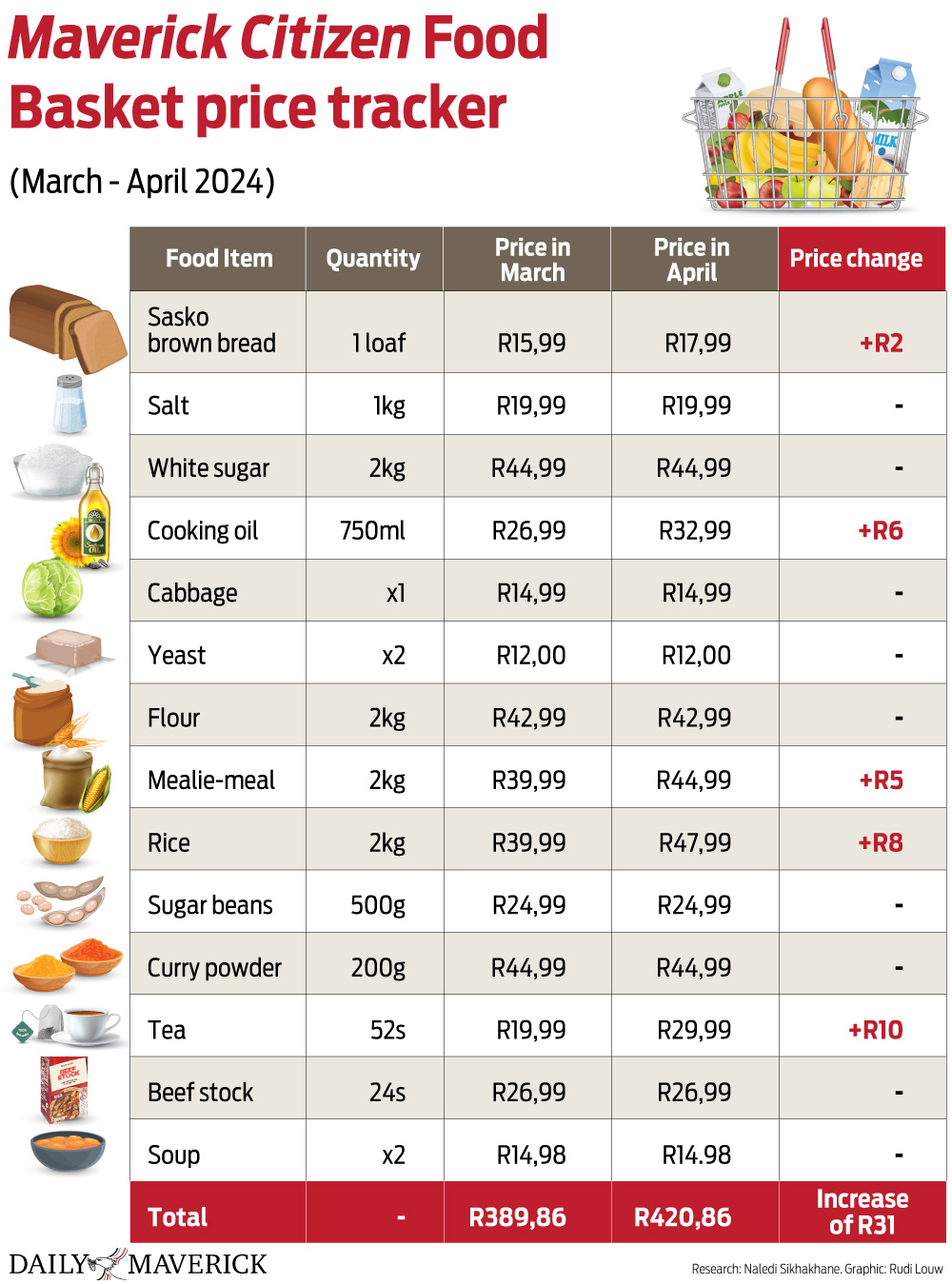Daily Maverick has been tracking the prices of 14 basic food items which a consumer can buy with the R350 Social Relief of Distress (SRD) grant. From April, the grant increases to R370.
There was a sharp rise in tea, mealie meal, rice and a moderate increase in oil, increasing the basket cost by R31 after all to over R400.
This is reflected in the latest instalment of the Household Affordability Index, which reports that the average cost of the foods prioritised and bought first in the household food basket increased month-on-month by R48.71 (1.7%) from R2,821.58 in March 2024 to R2,870.29 in April 2024.
The year-on-year, the average cost of the foods prioritised and bought first increased to R124.89 (4.5%) from R2,745.40 in April 2023 to R2,870.29 in April 2024. This category was created due to observing consumer behaviour and feedback from the women who collect the information in townships throughout South Africa.

(Graphic: Rudi Louw)
“These foods are relatively very expensive in relation to the total money available in the household purse to secure food. These foods must be bought regardless of price escalations. The high cost of core staple foods results in a lot of proper nutritious food being removed off the family plates. The consequences of high costs on the core foods has a negative impact on overall household health and wellbeing, and child development,” the report reads.
Tax burden on poor
The Household Affordability Index highlights that 22 of the 44 foods in the total household food basket are subject to Value Added Tax.
“Foods subject to VAT make up 46% of the total cost of the household food basket. VAT on the total household food basket came to R322.89 in April 2024. This means 6.1% of the household food basket is made up of VAT. A tax of R322.89 is nearly the same cost of a large household’s requirement of 30kg maize meal per month (in April 2024, 30kg maize meal cost R293.65). VAT on basic foodstuffs is still very high and removes food off the plate,” the report reads.
Read more in Daily Maverick: 2024 elections: where leading political parties stand on hunger (dailymaverick.co.za)
Inflation for food and non-alcoholic beverages (NAB) slowed to 5.1% in March from 6.1% in February. This is down from its recent peak of 14.0% in March 2023 and is the lowest annual increase since September 2020 when the rate was 3.8%.
According to a Stats SA report released on 17 April, “bread and cereals registered a softer annual print of 5.0% from February’s 6.1%”. The rate is substantially lower than the recent high of 21.8% in January 2023. Bread flour, pasta, rusks, maize meal, ready-mix flour and white bread are cheaper for consumers than a year ago.
“Meat inflation also cooled in March on the back of lower beef and mutton prices. The annual rate for meat in March was 0.8%, significantly lower than the recent peak of 11.4% in February 2023,” the report reads
Annual inflation for sugar, sweets and desserts has remained above the 15.0% level since June 2023. The rate in March 2024 was 17.8%. Products with the most significant annual price increases include brown sugar (up 22.0%), white sugar (up 20.1%), chocolate slabs (up 17.9%) and chocolate bars (up 15.9%).
The Social Relief of Distress grant was initially a temporary provision of assistance intended for persons in “such dire material need that they are unable to meet their families’ most basic needs”. However, due to the need of over 10 million unemployed people who rely on the grant, civil society has been calling for this to become a permanent form of income support, with some calling for it to be increased to the upper-bound poverty line of R1,558 (according to May 2023 figures) per person per month. This amount addresses the food poverty line plus the average amount derived from non-food items of households whose food expenditure is equal to the food poverty line.
The cost of living crisis is felt throughout all economic classes, the Index shows the working class gets poorer and poorer every year and is barely affording enough food for an average family of four.
“The minimum shortfall on food for a family is 45.6% in April 2024. After securing transport and electricity, workers are left with R2,046.52. If all of this money went to food, then for a family of four, it would provide R511.63 per person per month. The Food Poverty Line is R760,” the report reads. DM
![]()



 2 weeks ago
96
2 weeks ago
96

















